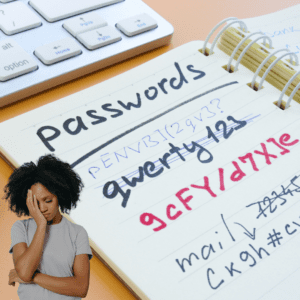In the world of cybersecurity, the debate around password strength has seen significant evolution in recent years. Traditionally, experts advised creating complex passwords with a mix of uppercase letters, lowercase letters, numbers, and special symbols. The goal was to boost security by making passwords harder to crack through brute-force attacks.
This approach isn’t user friendly and potentially creates security risks. Random strands of numbers and letters are difficult to remember. In today’s digital age, managing a multitude of complex passwords across various accounts has become burdensome.

As a result, employees often reuse passwords or they store passwords in insecure places. By doing so these employees are inadvertently putting their company’s security at risk.
We recommend using a simple passphrase, which is a simpler, yet highly effective alternative. We suggest forming a passphrase using three random words, a couple of numbers and a special character. This combination strikes a balance between security and convenience. This method creates passwords that are sufficiently long and challenging for common cracking techniques while remaining easy to remember.
The National Cyber Security Centre (NCSC) recently affirmed the value of passphrases, advocating for their adoption. Affirming the approach as a practical and secure for password management. Unlike traditional complex passwords, which may follow predictable patterns or include easily guessed elements, passphrases offer randomness and complexity without sacrificing ease of use.
Crafting a Secure Password Policy
For users aiming to strengthen their cybersecurity protection, implementing a passphrase-based password policy is a wise move. Here are 4BIS’s recommendations:
Passphrase Composition: Encourage employees to create passphrases composed of at least three random words. Aim for a length of 14-15 characters and add a couple of numbers and special characters for extra security.
Avoid Being Predictable: Discourage the use of obvious combinations such as sequential numbers or personal information. Avoid using birthdates or pet names, etc. This reduces the risk of password guessing and social engineering attacks.
Be Unique: Stress the importance of unique passwords for each user account. Shared passwords undermine accountability and pose significant security risks.
Multi-Factor Authentication (MFA): Where possible, supplement password policies with MFA. This additional layer of authentication adds another layer of security to gain access, even if passwords fail.
Password Manager: Consider using a password management tool to simplify secure password storage. Make sure your password manager has a secure password and MFA set up on it.
Strengthening Your Company’s Security Posture
By adopting a passphrase-focused approach, businesses can strengthen their overall security posture while promoting user-friendly password practices. This proactive strategy not only mitigates risks associated with weak passwords but also aligns with modern cybersecurity standards endorsed by leading authorities. These practices minimize security risks.
The practicality of passphrases emerges as a easy but strong solution to cybersecurity’s evolving landscape where simplicity and security can coexist effectively.
At 4BIS Cybersecurity we provide services that allow your staff to work efficiently while being fiscally responsible. We are experts at leading this complicated process to find what works for multiple companies. View our high-value range of services here and please contact us to discuss options for your company.
